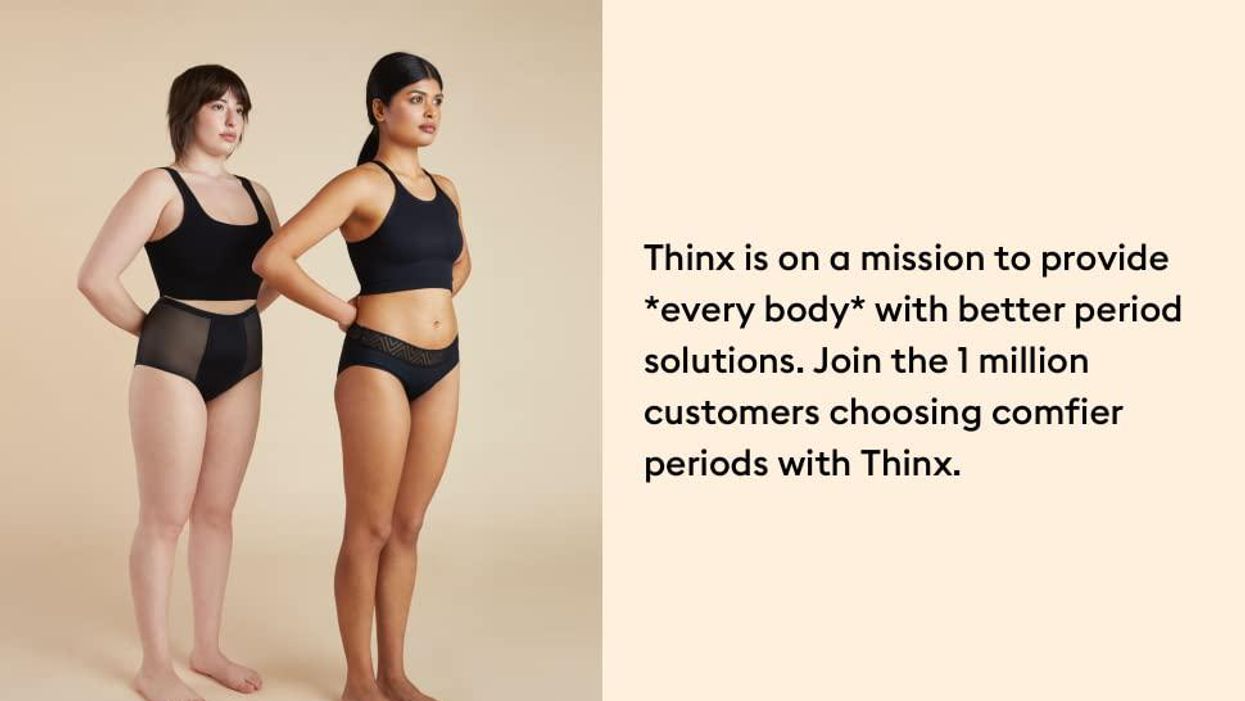
Thinx ads aim to break down taboos.
(Courtesy photo)

Thinx ads aim to break down taboos.
Leading personal care multinational Kimberly-Clark Corporation said Thursday that it acquired a majority stake in Thinx, a direct-to-consumer brand in the reusable period and incontinence underwear category.
Thinx, founded in New York City in 2013, makes a series of four brands, including its eponymous absorbent panties, which serve as an alternative to tampons and pads.
It's an example of a brand that employed direct-to-consumer growth strategies and in so doing raised awareness about a consumer category that stood to solve problems for women – namely, menstruation – but had been a marketing taboo. In recent years, its products have entered major retailers like Target and CVS, as well as expanded its product line to include activewear.
In 2019, Thinx received an investment from Kimberly-Clark, which counts Kotex and Depend among its brands.
"Kimberly-Clark invented the 'femcare' category 100 years ago and Thinx invented the 'femtech' category nine years ago. It's fitting that we will be working more closely with a like-minded organization to realize our mission and vision, and to enable Thinx underwear to more quickly become a mainstream product for period and bladder leak needs," said Maria Molland, CEO of Thinx, in a statement. "I'm so proud of the work this team has done to get to this point and thrilled that Kimberly-Clark is dedicated to not only helping us retain our entrepreneurial character, but also giving us the opportunity to tap into their expertise to accelerate our growth and ability to innovate."
Terms of the deal were not disclosed.
Applications are open for startups interested in the 12-week Store Nº8 dCommerce Base Camp.
Walmart incubation arm Store Nº8 and Web3 accelerator Outlier Ventures are teaming up to support retail startups.
The organizations opened applications this week for the Store Nº8 dCommerce Base Camp accelerator. The virtual program will offer education, funding and mentorship to startups building solutions in Web3 that are designed for the retail and commerce experience.
Focus areas for selected startups will include decentralized infrastructure, data and growth solutions, immersive experiences and the metaverse and the intersection of AI and blockchain technology.
“We think dCommerce represents a huge opportunity to unbundle ecommerce into its constituent parts, and into a more decentralized and composable stack of protocols to create a more efficient, equitable and improved experience for retailers and consumers from CRM to last-mile delivery," said Outlier Ventures CEO Jamie Burke, in a statement. "There is clearly no better partner than Store Nº8, as Walmart's incubation arm, so we are thrilled to launch this accelerator program together.”
Beginning in mid-August, founders will take part in a 12-week program. The cohort members will receive funding and access to subject matter experts from Store Nº8 and Outlier Ventures. They will also receive support from industry mentors in areas such as product roadmap development, the token economy and fundraising.
“Decentralized commerce has the potential to unlock new value in the global commerce ecosystem, so we are excited to partner with Outlier Ventures to support and engage with entrepreneurs building at the forefront of this technology on their path to scale," said Store Nº8 VP Thomas Kang, in a statement.
The new program arrives in the year after Web3 and the metaverse saw a spike in interest from brands and retailers, as the arrival of immersive platforms opened up new digital environments where consumers gathered. Walmart entered the metaverse through an activation on Roblox, and also introduced a platform for digital collectibles. But it remains a nascent space, so there’s room for startups bringing fresh ideas to help larger enterprises develop capabilities. Alongside connections that help startups move forward, such learning is one potential outcome of the accelerator could last beyond the 12 weeks.
Applications for the accelerator are available here.